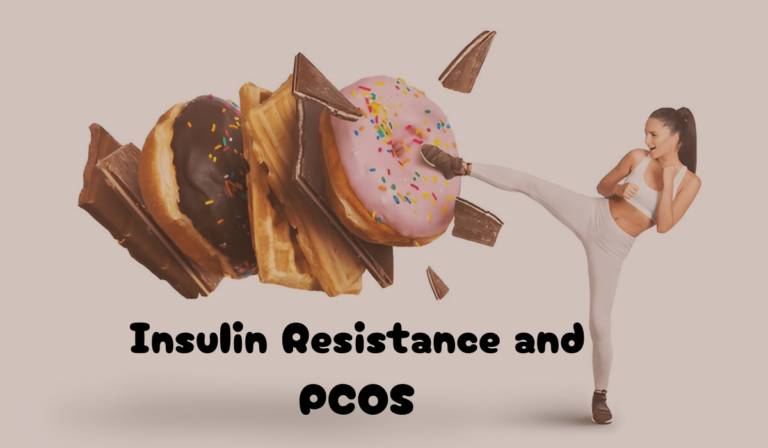
Women going through Polycystic Ovary Syndrome (PCOS) have to make multiple lifestyle changes including choosing the right dietary approach. These changes are essential for them because of the symptoms that come along with PCOS. One such symptom, insulin resistance makes it harder to manage weight, regulate hormones, and maintain overall health. In this article, we will discuss how insulin resistance and PCOS are related and how to manage it with a PCOS-friendly diet.
Understanding Insulin Resistance in PCOS

What is Insulin Resistance?
How many of you know what insulin resistance is? Well, here is a simple answer, and you need to know it for a better understanding of insulin resistance and PCOS is related.
Insulin is a hormone produced by the pancreas that helps regulate blood sugar levels by allowing cells to absorb glucose (sugar) from the bloodstream. When the body becomes resistant to insulin, the cells no longer respond efficiently, resulting in elevated blood sugar levels. The pancreas compensates by producing more insulin, leading to hyperinsulinemia (excess insulin in the blood). Excess insulin in blood causes spikes in blood sugar levels which leads to the risk of a chronic disease, diabetes.
With time, insulin resistance will cause other health issues for women with PCOS. they might have to experience weight gain, inflammation and an increased risk of type 2 diabetes. You can also face metabolic issues, including high blood pressure, high cholesterol, and cardiovascular health.
How Insulin Resistance Affects PCOS
So, understanding insulin resistance and PCOS would become easy when you will now hope insulin resistance affects PCOS. So, women with PCOS have to face a common issue which is insulin resistance. The excess insulin in the body leads to production of more androgens by the ovaries. Androgen is a male hormone responsible for the production of testosterone. The production of male hormones could worsen the symptoms like:
- Irregular menstrual cycles
- Weight gain, especially around the abdomen
- Acne and oily skin
- Excess hair growth (hirsutism)
- Difficulty in ovulation and fertility challenges
Now, you know how insulin resistance and PCOS are related and why you need to manage it. The best way to manage insulin resistance known to everyone is the dietary approach.
The Role of Diet in Managing Insulin Resistance
Diet plays a crucial role in managing PCOS symptoms including insulin resistance and blood sugar levels. Women with PCOS need to consume a balanced, PCOS-friendly diet that focuses on whole foods so it can help to improve insulin sensitivity, reduce inflammation and promote hormonal balance.
For a PCOS-friendly diet, you need to incorporate foods that help to stabilize blood sugar while avoiding the foods that cause rapid spikes in your blood sugar levels.
Key Components of a PCOS-Friendly Diet for Insulin Resistance
- Low Glycemic Index (GI) Foods
Choose foods with a low glycemic index. Such foods are digested more slowly, preventing rapid increases in blood sugar levels helping in managing insulin resistance of the body. These foods help regulate insulin levels and keep hunger at bay by ensuring you feel full for a longer time because they contain fiber content. This makes them ideal for managing insulin resistance.
- Examples of Low GI Foods:
Include low GI foods in your diet like:
- Whole grains (quinoa, oats, barley)
- Legumes (lentils, chickpeas, black beans)
- Non-starchy vegetables (leafy greens, broccoli, cauliflower)
- Berries and apples
- High Fiber Foods
Including fiber-rich food in your PCOS diet is necessary because it slows the absorption of sugar and helps improve insulin sensitivity. A diet rich in fiber not only helps control blood sugar levels but also supports gut health. Fiber-rich food is essential because women often face issues because of PCOS and it can help them maintain issues that come along with it and also help improve their overall health.
- High Fiber Foods:
- Vegetables (Brussels sprouts, carrots, kale)
- Fruits (pears, avocados, berries)
- Whole grains (brown rice, whole-wheat bread)
- Seeds and nuts (chia seeds, flaxseeds, almonds)
- Healthy Fats
Another macronutrient, fats, is essential for your overall health and to manage PCOS symptoms. Including food sources of healthy fats, especially omega-3 fatty acids that help to reduce inflammation, promote hormonal balance and improve insulin sensitivity. Healthy fats will also help you to feel fuller for longer periods, reducing the risk of overeating which will eventually help to maintain your weight.
- Sources of Healthy Fats:
- Fatty fish (salmon, mackerel, sardines)
- Avocados
- Olive oil and coconut oil
- Nuts and seeds (walnuts, chia seeds)
- Lean Protein
Adding protein in your diet is the most necessary because they are the building blocks of your body. Make sure you add lean protein sources in your diet which will help to stabilize blood sugar levels by slowing down the digestion of carbohydrates. Along with promoting the feeling of satiety, protein also helps to prevent spikes in blood sugar levels. Include lean protein sources like:
- Lean Protein Sources:
- Poultry (chicken, turkey)
- Eggs
- Tofu and tempeh
- Fish and seafood
- Plant-based proteins (lentils, chickpeas)
- Anti-inflammatory Foods
Inflammation is another symptom of PCOS and it can worsen insulin resistance and PCOS symptoms. Women with PCOS should Incorporate anti-inflammatory foods that can help manage both insulin resistance and chronic low-grade inflammation. Both of which are commonly seen in women with PCOS
- Anti-inflammatory Foods:
- Turmeric
- Ginger
- Green leafy vegetables
- Berries and cherries
- Green tea
- Limiting Refined Carbohydrates and Sugars
Refined carbohydrates and sugars should be no in a PCOS-friendly diet. We now know the relation between insulin resistance and PCOS, this means foods that spike blood sugar levels should not be included in your diet. Refined carbs and sugars can cause rapid spikes in blood sugar levels, making insulin resistance worse. Make a note to not consume sugary snacks, processed foods, and refined grains, like white bread and pastries, to significantly improve insulin sensitivity.
- Avoid or Limit:
- Sugary beverages (sodas, sweetened teas)
- White bread, pasta, and rice
- Pastries, cakes, and cookies
- Processed snacks (chips, candy)
Practical Meal Ideas for Managing Insulin Resistance
A PCOS-friendly diet is one which includes foods that are good for your health. Including such foods does not mean you have to restrict yourself from eating your favorite foods. All you have to do is make healthy choices to manage insulin resistance and PCOS along with other symptoms. Here are some practical meal ideas to help you manage insulin resistance while enjoying flavorful, satisfying food:
- Breakfast:
- You can have Greek yogurt with chia seeds, blueberries, and walnuts in your breakfast.
- Another healthy option is scrambled eggs with spinach and avocado on whole-grain toast
- Oatmeal topped with almond butter and fresh berries also make a healthy breakfast in a PCOS-friendly diet.
- Lunch:
- You can prepare quinoa salad with chickpeas, cucumbers, cherry tomatoes, and olive oil dressing for your lunch
- Have grilled chicken with mixed greens, avocado, and a lemon vinaigrette for a healthy lunch.
- Prepare lentil soup with a side of whole-grain bread for a soulful dinner.
- Dinner:
- You can have baked salmon with roasted Brussels sprouts and sweet potatoes for your dinner
- Stir-fry tofu and have it with brown rice and steamed broccoli for your dinner.
- Prepare grilled turkey burgers with a side of mixed vegetables as your dinner.
- Snacks:
- You can have a handful of almonds or walnuts
- Incorporate healthy snacks like carrot sticks with hummus
- You can have apple slices with peanut butter
Lifestyle Tips to Support Insulin Sensitivity
Diet will only give you successful results when you are also opting for some other lifestyle changes to manage insulin resistance and PCOS. Therefore, in addition of a PCOS-friendly diet, incorporating healthy lifestyle habits can further improve insulin sensitivity:
- Regular Physical Activity: Make sure you are exercising regularly so you can manage your PCOS symptoms effectively. Exercising will help your body become more responsive to insulin and also helps in weight management. You don’t have to go for vigorous exercises at the gym. Start from moderate exercises or activities like walking, swimming, or cycling, for at least 30 minutes most days of the week.
- Manage Stress: Stress could lead to hormonal imbalances, weight gain and other health issues. If you experience chronic stress, it can increase cortisol levels, which can contribute to insulin resistance. Incorporating stress-reducing activities like meditation, deep breathing, yoga, or spending time in nature can help you to maintain PCOS symptoms as well.
- Adequate Sleep: You need to make sure you get adequate sleep. Poor sleep patterns can worsen insulin resistance and disrupt hormones. Aim for 7-9 hours of quality sleep each night so you can manage the symptoms. Good-quality sleep is also necessary for your overall health.
- Stay Hydrated: Water helps regulate blood sugar levels and supports overall metabolic health. Avoid sugary drinks, and focus on drinking plenty of water throughout the day.
Frequently Asked Questions
Is PCOS caused by insulin resistance?
Ans. PCOS is not caused by insulin resistance. In fact the cause of PCOS is still unknown. Actually, insulin resistance is one of the common symptoms of PCOS.
What comes first, PCOS or insulin resistance?
Ans. The symptoms of PCOS are recognized before the symptoms of insulin resistance.
What is the root cause of PCOS?
Ans. PCOS is generally attributed to genetic and environmental factors but the exact cause of PCOS is unknown.




